Anu Recommends #15
Malaysian folklore, historical fiction, original poetry, a review, and some shoutouts
Hi and welcome to (another month of 😮) the Storyteller!
As promised, “normal” service is now resumed, though I can’t make any promises about not randomly gushing about Tolkien’s world and works every now and then. It’s a risk you’re (hopefully) willing to take. 😃
Well, then, what have I been reading in the meantime? Not much is the honest answer. March collided with some very important ongoing creative projects, and a bunch of other things, and some more things (isn’t that the way of the world), so for the first time in years, I’ve read all of (I hope you’re sitting down) one book in a month (it was a very good book, though, and I can’t wait to talk about it some more in a bit). I continued to watch Brooklyn 99 with my parents and read a lot of newsletters and articles, but there’s a different kind of creative, emotional, and mental space required for a book that I didn’t have very much of for the past few weeks, and I’m excited to get back to all of my unread babies.
But, first, here are some of the recent posts to give me joy (and yes, they’re all sports related—two out of three are Arsenal—but what’s a girl to do).
If you go to my profile, you’ll see a full list of all the newsletters I subscribe to on here, and also short notes on why I follow them.
What am I currently reading?
Even when one hasn’t returned to their to-read piles (physical and digital) after a month-long hiatus, one suffers from an (entirely first-world) problem of plenty. But when you add in publishers sending advance review copies to said hiatus, you have me.
The one my mood-reading mind picked was Her Lost Words by Stephanie Marie Thornton which her publisher was kind enough to send my way. The book came out on March 28, 2023.
Publisher’s blurb:
1792. As a child, Mary Wollstonecraft longed to disappear during her father’s violent rages. Instead, she transforms herself into the radical author of the landmark volume A Vindication of the Rights of Woman, in which she dares to propose that women are equal to men. From conservative England to the blood-drenched streets of revolutionary France, Mary refuses to bow to society’s conventions and instead supports herself with her pen until an illicit love affair challenges her every belief about romance and marriage. When she gives birth to a daughter and is stricken with childbed fever, Mary fears it will be her many critics who recount her life’s extraordinary odyssey…
1818. The daughter of infamous political philosopher Mary Wollstonecraft, passionate Mary Shelley learned to read by tracing the letters of her mother’s tombstone. As a young woman, she desperately misses her mother’s guidance, especially following her scandalous elopement with dashing poet Percy Bysshe Shelley. Mary struggles to balance an ever-complicated marriage with motherhood while nursing twin hopes that she might write something of her own one day and also discover the truth of her mother’s unconventional life. Mary’s journey will unlock her mother’s secrets, all while leading to her own destiny as the groundbreaking author of Frankenstein.
A riveting and inspiring novel about a firebrand feminist, her visionary daughter, and the many ways their words transformed our world.
Doesn’t it sound intriguing? Stay tuned!
Now onto the one book I read (and luckily enjoyed) in March.
Review: Hamra and the Jungle of Memories by Hanna Alkaf
There was a girl named Hamra who lived in a crooked house on the edge of the tangled Langkawi jungle, with a mother and father who told her what to do, a grandfather who told her stories, and a grandmother who told her truths. In time, she would come to discover that all of these things were equally important.
Thus begins Hamra and the Jungle of Memories, Hanna Alkaf’s lush, inventive Malaysian folklore twist on Little Red Riding Hood. This is her author’s second middle-grade offering and while, for me, it wasn’t an out-of-the-park favourite like her first (I read and loved her MG debut, The Girl and the Ghost a few years ago which is why I requested this on Netgalley), there is much to enjoy on this jungle adventure coming-of-age story.
A quick Google search informed me that two-thirds of the island of Langkawi is covered by forested mountains, hills, and natural vegetation. It is in and to these locations where our protagonist (along with best friend Ilyas and the weretiger of Langkawi) must journey on their quest.
Hamra, and every other child on the island, has grown up listening to, and abiding by, the rules of the forest:
Always ask permission before you enter.
Don’t challenge what you can’t even see.
Never use your true name.
Never take what isn’t yours.
If you hear someone calling your name, never, ever look behind you.
The story opens on Hamra’s 13th birthday, in the early throes of the COVID pandemic when she is feeling particularly stir-crazy and frustrated. Her father, his tourist boat business temporarily suspended, is instead helping to carry aid to those in need; her mother, a medical professional, has been called to the front lines; her Opah (grandmother) has started to forget as her dementia progresses; her Atok (grandfather) is doing his best—but they have all forgetten this momentous occasion. And Hamra is, instead, sent into the jungle to pick leaves to make nasi ulam, her Opah’s favourite meal.
Hamra breaks the first rule without meaning to, each one after deliberately, rebelliously—furtive, then increasingly belligerent.
But breaking a rule has consequences. Especially when you take something (in this case, a fruit, a ripe, juicy jambu that Opah loves) from the forest’s feared weretiger who now needs the debt repaid.
Hamra is a hijab-wearing heroine with ‘a head full of restless thoughts and a heart full of restless flame’ while her best friend Ilyas is more rule-bound, quieter in comparison, dependable. Both are pretty well-etched characters—Hamra, in particular, is a wonderful encapsulation of a new 13-year-old girl in all the complexity and annoyance that characterises it, through all the stubborness, rebellion, anger, and frustration… and the hopes, the dreams, the magic of discovery.
How do you recognise when a story chooses you? What good is power if you don’t know who you are, and therefore, what to use it for?
As with The Girl and the Ghost, Alkaf expertly, effortlessly, and unapologetically roots the story in Malaysian culture and its myths, in her religion and her faith; manages to simultaneously dip into darkness, hard truths, and life’s unfairness, while maintaining a strong, steady emotional core. I also love her sharp, witty, often dry, sense of humour and sarcasm.
Hamra and the Jungle of Memories is a coming-of-age story as much as it is a reckoning that we must face/live with the consequences of our actions, no matter our age. That, sometimes, you cannot do anything but keep going. That even monsters can be haunted. That, sometimes, even in fairytales, there are no magical shortcuts. This is a story about the stories we tell ourselves, the memories that stay and the ones we lose.
The author wrote this story during the pandemic, during a tricky mental health spell for her personally, and that frame of mind does seep into the story here. The claustrophobic, slightly unreal quality which makes Hamra’s quest all the more urgent, all the more vicarious, for readers who can well remember what those days of isolation, restrictions, and peak uncertainty were like.
If I had to quibble, I would say that the quest (and the individual tasks they had to accomplish on the way) seemed a little too linear, a little too lucky in their progression, and that the ending was a little too abrupt. The worldbuilding was vivid in parts but felt equally lacking at times.
But there is enough heart and wonder in this story about friendship, family, courage, forgiveness, grief, and more. So if you enjoy middle-grade stories with brave, headstrong heroines, magic, and adventure, I’d recommend checking out this one. I want to read Alkaf’s young adult books next, so you’ll be hearing about them later in the year!
“Mainly, I guess when I think about being human, I think about trying. Trying to live a good life, trying to be a good person, trying to take care of each other. And sometimes you like the results, and sometimes you don’t. But there’s a lot of magic and wonder in the trying.”
What have all of you been reading or watching?
Some poetry before I sign off today
March 21, 2023 was World Poetry Day. Now, I’m not much of a poet, but I do dabble in some occasionally. Here’s a poem of mine that was originally published by Celestite Poetry in late 2021 that I shared on my Instagram on the day.
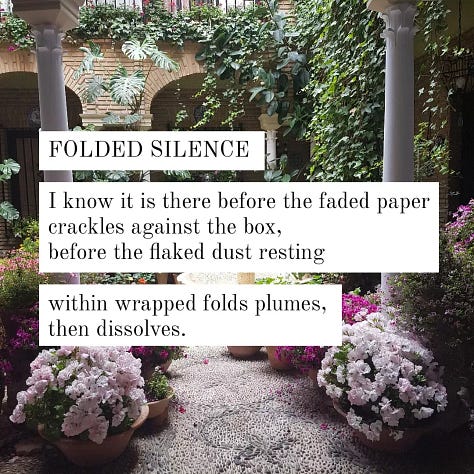
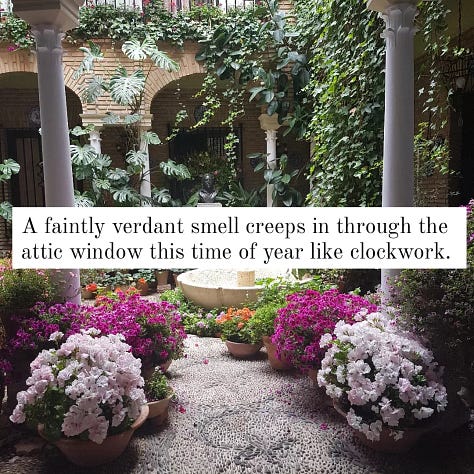
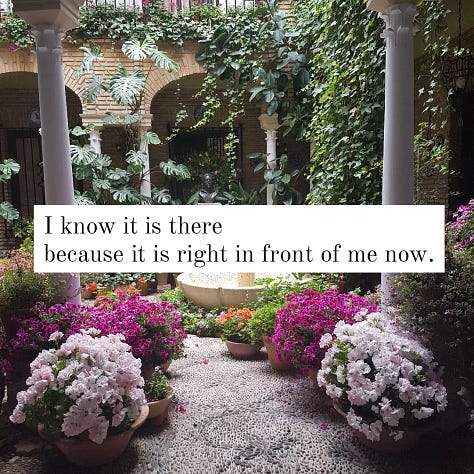
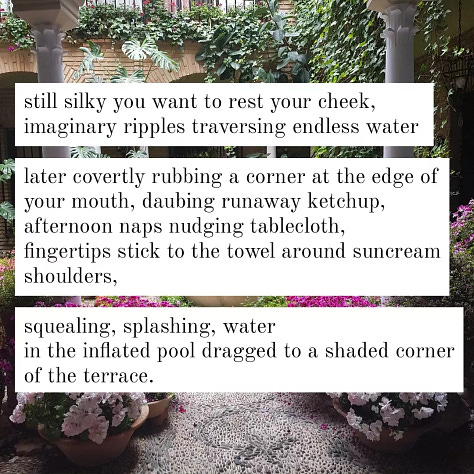
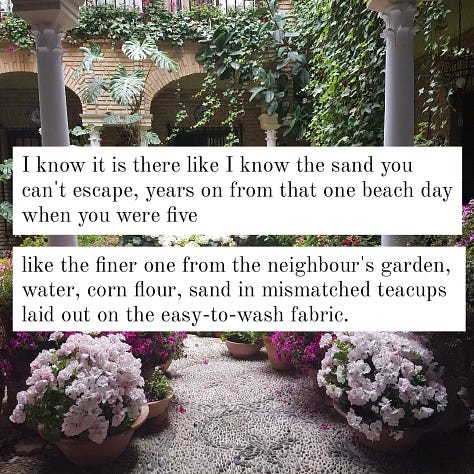
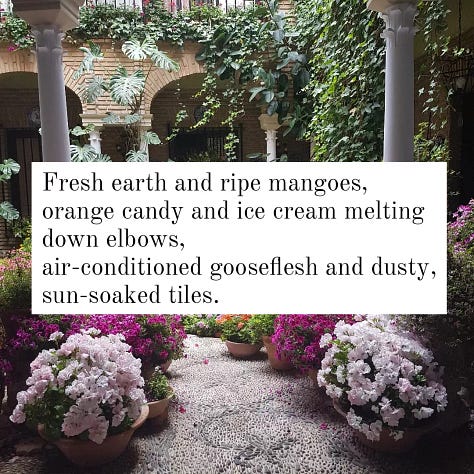
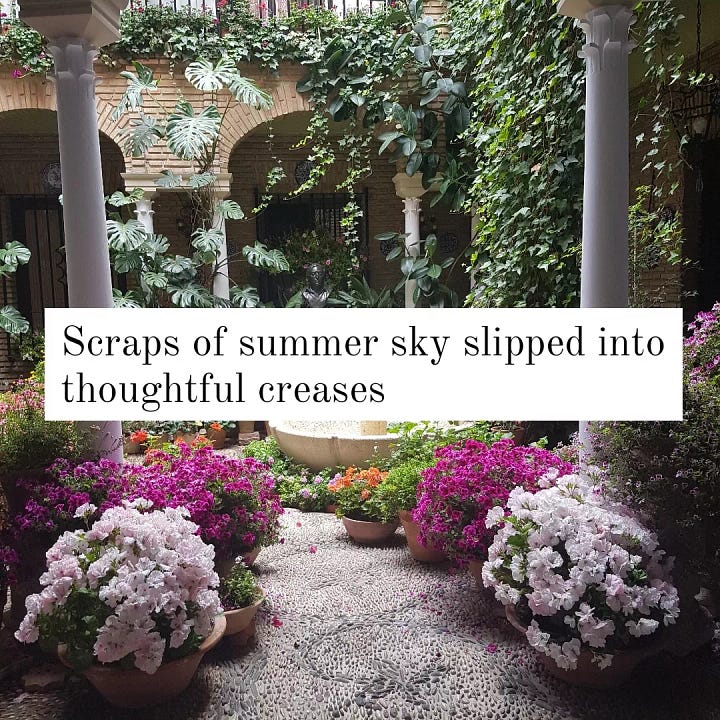
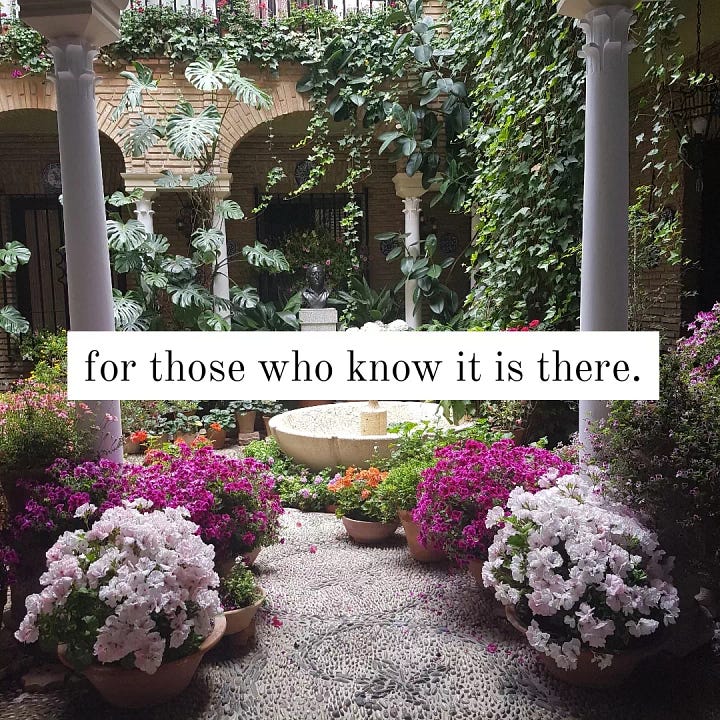
What do you think it’s about? I’d love to know your thoughts in the comments!
As always, please feel free send in recommendations—books, movie, TV shows, authors to interview, ideas of what you’d like me to write on, rants/ramblings/excited monologues, GIFs and memes (especially them) and more. Just drop me a line and turn this into a conversation, even if just to say hi and let me know what you thought of the latest issue :) Or share this with someone you think might enjoy it.
Take care and see you next week!
Anu
If you really like the newsletter, please feel free to buy me a coffee: https://ko-fi.com/anushreenande
You can find me on Twitter at @AnuNande (follow for all the football chatter) and on Instagram at @booksinboston.

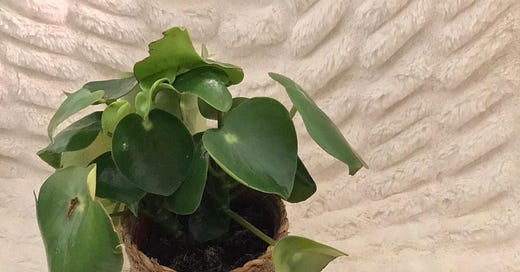







Just here to say, scraps of summer sky is such a wonderful phrase. It's going to stay with me for a while.
Dear Anu, many thanks for introducing us readers to so many diverse idea, plots and authors. Its an enriching experience.